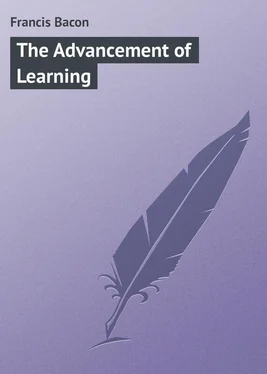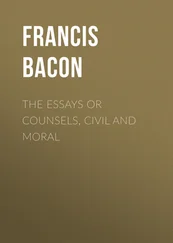Francis Bacon - The Advancement of Learning
Здесь есть возможность читать онлайн «Francis Bacon - The Advancement of Learning» — ознакомительный отрывок электронной книги совершенно бесплатно, а после прочтения отрывка купить полную версию. В некоторых случаях можно слушать аудио, скачать через торрент в формате fb2 и присутствует краткое содержание. Год выпуска: 0101, Жанр: foreign_antique, foreign_prose, на английском языке. Описание произведения, (предисловие) а так же отзывы посетителей доступны на портале библиотеки ЛибКат.
- Название:The Advancement of Learning
- Автор:
- Жанр:
- Год:0101
- ISBN:нет данных
- Рейтинг книги:5 / 5. Голосов: 1
-
Избранное:Добавить в избранное
- Отзывы:
-
Ваша оценка:
- 100
- 1
- 2
- 3
- 4
- 5
The Advancement of Learning: краткое содержание, описание и аннотация
Предлагаем к чтению аннотацию, описание, краткое содержание или предисловие (зависит от того, что написал сам автор книги «The Advancement of Learning»). Если вы не нашли необходимую информацию о книге — напишите в комментариях, мы постараемся отыскать её.
The Advancement of Learning — читать онлайн ознакомительный отрывок
Ниже представлен текст книги, разбитый по страницам. Система сохранения места последней прочитанной страницы, позволяет с удобством читать онлайн бесплатно книгу «The Advancement of Learning», без необходимости каждый раз заново искать на чём Вы остановились. Поставьте закладку, и сможете в любой момент перейти на страницу, на которой закончили чтение.
Интервал:
Закладка:
(3) And for meanness of employment, that which is most traduced to contempt is that the government of youth is commonly allotted to them; which age, because it is the age of least authority, it is transferred to the disesteeming of those employments wherein youth is conversant, and which are conversant about youth. But how unjust this traducement is (if you will reduce things from popularity of opinion to measure of reason) may appear in that we see men are more curious what they put into a new vessel than into a vessel seasoned; and what mould they lay about a young plant than about a plant corroborate; so as this weakest terms and times of all things use to have the best applications and helps. And will you hearken to the Hebrew rabbins? “Your young men shall see visions, and your old men shall dream dreams:” say they, youth is the worthier age, for that visions are nearer apparitions of God than dreams? And let it be noted that howsoever the condition of life of pedantes hath been scorned upon theatres, as the ape of tyranny; and that the modern looseness or negligence hath taken no due regard to the choice of schoolmasters and tutors; yet the ancient wisdom of the best times did always make a just complaint, that states were too busy with their laws and too negligent in point of education: which excellent part of ancient discipline hath been in some sort revived of late times by the colleges of the Jesuits; of whom, although in regard of their superstition I may say, Quo meliores , eo deteriores ; yet in regard of this, and some other points concerning human learning and moral matters, I may say, as Agesilaus said to his enemy Pharnabazus, Talis quum sis , utunam noster esses . And that much touching the discredits drawn from the fortunes of learned men.
(4) As touching the manners of learned men, it is a thing personal and individual: and no doubt there be amongst them, as in other professions, of all temperatures: but yet so as it is not without truth which is said, that Abeunt studua in mores , studies have an influence and operation upon the manners of those that are conversant in them.
(5) But upon an attentive and indifferent review, I for my part cannot find any disgrace to learning can proceed from the manners of learned men; not inherent to them as they are learned; except it be a fault (which was the supposed fault of Demosthenes, Cicero, Cato II., Seneca, and many more) that because the times they read of are commonly better than the times they live in, and the duties taught better than the duties practised, they contend sometimes too far to bring things to perfection, and to reduce the corruption of manners to honesty of precepts or examples of too great height. And yet hereof they have caveats enough in their own walks. For Solon, when he was asked whether he had given his citizens the best laws, answered wisely, “Yea, of such as they would receive:” and Plato, finding that his own heart could not agree with the corrupt manners of his country, refused to bear place or office, saying, “That a man’s country was to be used as his parents were, that is, with humble persuasions, and not with contestations.” And Cæsar’s counsellor put in the same caveat, Non ad vetera instituta revocans quæ jampridem corruptis moribus ludibrio sunt ; and Cicero noteth this error directly in Cato II. when he writes to his friend Atticus, Cato optime sentit , sed nocet interdum reipublicæ; loquitur enim tanquam in republicâ Platonis , non tanquam in fæce Romuli . And the same Cicero doth excuse and expound the philosophers for going too far and being too exact in their prescripts when he saith, Isti ipse præceptores virtutis et magistri videntur fines officiorum paulo longius quam natura vellet protulisse , ut cum ad ultimum animo contendissemus , ibi tamen , ubi oportet , consisteremus : and yet himself might have said, Monitis sum minor ipse meis ; for it was his own fault, though not in so extreme a degree.
(6) Another fault likewise much of this kind hath been incident to learned men, which is, that they have esteemed the preservation, good, and honour of their countries or masters before their own fortunes or safeties. For so saith Demosthenes unto the Athenians: “If it please you to note it, my counsels unto you are not such whereby I should grow great amongst you, and you become little amongst the Grecians; but they be of that nature as they are sometimes not good for me to give, but are always good for you to follow.” And so Seneca, after he had consecrated that Quinquennium Neronis to the eternal glory of learned governors, held on his honest and loyal course of good and free counsel after his master grew extremely corrupt in his government. Neither can this point otherwise be, for learning endueth men’s minds with a true sense of the frailty of their persons, the casualty of their fortunes, and the dignity of their soul and vocation, so that it is impossible for them to esteem that any greatness of their own fortune can be a true or worthy end of their being and ordainment, and therefore are desirous to give their account to God, and so likewise to their masters under God (as kings and the states that they serve) in those words, Ecce tibi lucrefeci , and not Ecce mihi lucrefeci ; whereas the corrupter sort of mere politiques, that have not their thoughts established by learning in the love and apprehension of duty, nor never look abroad into universality, do refer all things to themselves, and thrust themselves into the centre of the world, as if all lines should meet in them and their fortunes, never caring in all tempests what becomes of the ship of state, so they may save themselves in the cockboat of their own fortune; whereas men that feel the weight of duty and know the limits of self-love use to make good their places and duties, though with peril; and if they stand in seditious and violent alterations, it is rather the reverence which many times both adverse parts do give to honesty, than any versatile advantage of their own carriage. But for this point of tender sense and fast obligation of duty which learning doth endue the mind withal, howsoever fortune may tax it, and many in the depth of their corrupt principles may despise it, yet it will receive an open allowance, and therefore needs the less disproof or excuse.
(7) Another fault incident commonly to learned men, which may be more properly defended than truly denied, is that they fail sometimes in applying themselves to particular persons, which want of exact application ariseth from two causes – the one, because the largeness of their mind can hardly confine itself to dwell in the exquisite observation or examination of the nature and customs of one person, for it is a speech for a lover, and not for a wise man, Satis magnum alter alteri theatrum sumus . Nevertheless I shall yield that he that cannot contract the sight of his mind as well as disperse and dilate it, wanteth a great faculty. But there is a second cause, which is no inability, but a rejection upon choice and judgment. For the honest and just bounds of observation by one person upon another extend no further but to understand him sufficiently, whereby not to give him offence, or whereby to be able to give him faithful counsel, or whereby to stand upon reasonable guard and caution in respect of a man’s self. But to be speculative into another man to the end to know how to work him, or wind him, or govern him, proceedeth from a heart that is double and cloven, and not entire and ingenuous; which as in friendship it is want of integrity, so towards princes or superiors is want of duty. For the custom of the Levant, which is that subjects do forbear to gaze or fix their eyes upon princes, is in the outward ceremony barbarous, but the moral is good; for men ought not, by cunning and bent observations, to pierce and penetrate into the hearts of kings, which the Scripture hath declared to be inscrutable.
Читать дальшеИнтервал:
Закладка:
Похожие книги на «The Advancement of Learning»
Представляем Вашему вниманию похожие книги на «The Advancement of Learning» списком для выбора. Мы отобрали схожую по названию и смыслу литературу в надежде предоставить читателям больше вариантов отыскать новые, интересные, ещё непрочитанные произведения.
Обсуждение, отзывы о книге «The Advancement of Learning» и просто собственные мнения читателей. Оставьте ваши комментарии, напишите, что Вы думаете о произведении, его смысле или главных героях. Укажите что конкретно понравилось, а что нет, и почему Вы так считаете.












